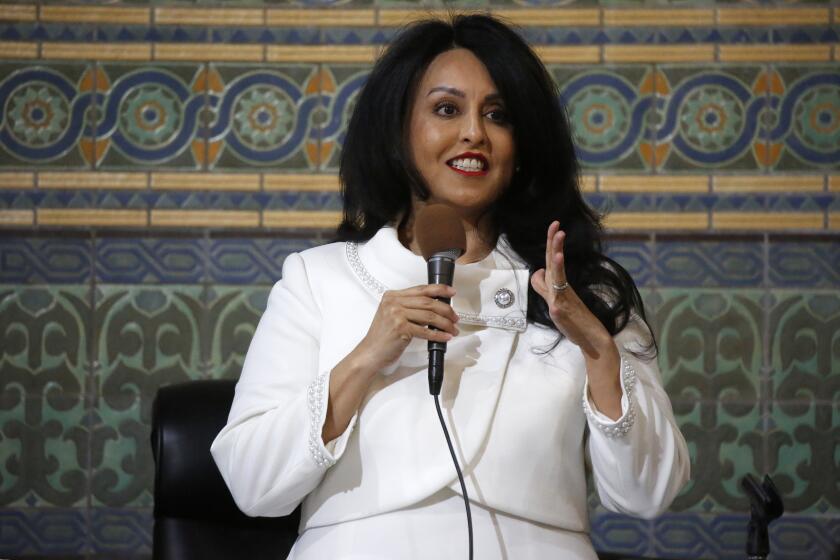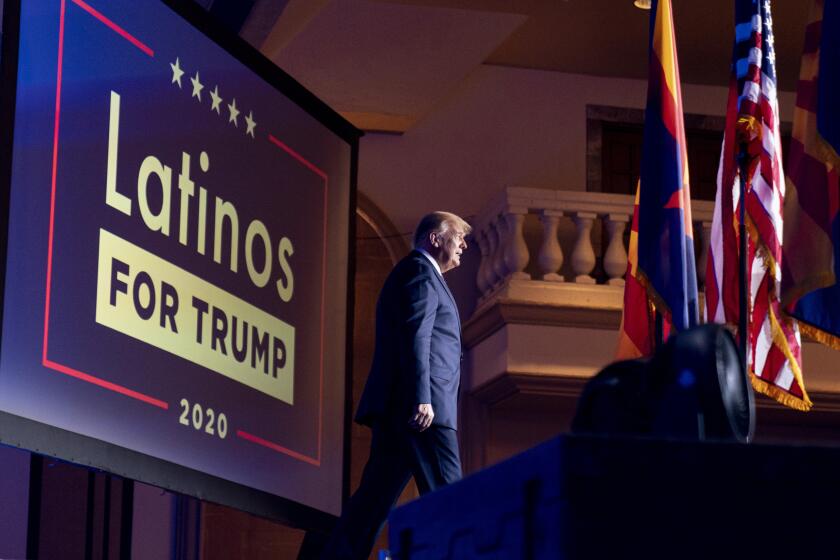Column: L.A. needs a new generation of Latino leaders

- Share via
Behind closed doors, they sound like former President Trump.
Riffing about racist violence; denigrating entire groups based on where they come from and their darker skin; and plotting to hold onto power in spite of voters are all trademark behaviors of the MAGA mogul. Yet leaked audio revealed this week that Los Angeles City Councilmembers Nury Martinez, Gil Cedillo and Kevin De León are all guilty of participating in unhinged conversations of that nature in private.
These three prove that L.A. needs a new generation of Latinos at its helm — one that can rewrite the zero-sum rules imposed on us by white supremacy. Younger progressive leaders — such as Eunisses Hernandez, a vocal criminal justice reformer who defeated Cedillo this year and will replace him in December — are ready to do that difficult work.
Opinion Columnist
Jean Guerrero
Jean Guerrero is the author, most recently, of “Hatemonger: Stephen Miller, Donald Trump and the White Nationalist Agenda.”
The conversation on the leaked recording has been devastating for Angelenos who saw these leaders as allies, role models or heroes. Even if you’ve long known about the toxic legacy of anti-Blackness and anti-Indigeneity among Latinos, especially among older generations, the revelation still hurts.
Martinez resigned from the council on Wednesday. Until all three councilmembers have resigned, they preclude the possibility of healing for Los Angeles. They represent a mind-set their communities have fought to leave behind.
“For a long time, Latino and Mexican American communities have had a choice to make about where they’re going to stand in relation to white supremacy and whiteness,” said Kelly Lytle Hernández, a professor of history and African American studies at UCLA. “And in those tapes you’re hearing a certain set of commitments to white supremacy.”
Describing an Armenian politico by his eyebrows was crass, but it was a mild insult compared to the devastating racism spewed by Nury Martinez.
Martinez led the ugliest parts of the conversation. She compared her colleague Mike Bonin’s young Black son to a “changuito,” or monkey, and fantasized aloud about beating the child. She described Oaxacans as “short little dark people” and “Tan feos,” Spanish for so ugly.
The others chimed in with their own revolting thoughts.
Like many people in the Latinx community, I had wanted to believe in De León, who joined the council in 2020. As president pro tem of the California Senate, he had led the fight for California to become a sanctuary state in 2017. He appeared to have what it takes to fight racism. But looking back, I can’t write off the recorded conversation as a one-time lapse in his judgment.
De León called me last year to introduce himself and complain about the intensity of the outrage about the Border Patrol’s abuse of Haitian migrants. He commented that in the past, Black lawmakers hadn’t stood up for Latino immigrants’ rights.
California Atty. Gen. Rob Bonta said his office will investigate L.A.’s 2021 redistricting process in the wake of the leaked audio scandal.
When I said it was a mistake to think in such “us vs. them” terms, De León suggested debating the issue over coffee. I never took him up on that.
A politician who thinks like that doesn’t need a debate over coffee. He needs to be replaced.
I remembered his comments while listening to the leaked audio in which he repeatedly expressed jealousy about Black political power, revealing a lack of understanding or appreciation for the central role Black people have played in paving a path toward justice and representation for Latinos.
Most damningly, it unmasks a man who doesn’t believe we’re all in this together. Perhaps De León can earn the community’s forgiveness someday, but the reckoning comes first.
None of the conversation’s participants appear to understand that multiracial solidarity is our only hope to build a city that can stand as a true beacon in the fight against fascism and white supremacy. Their frustration with Latinx underrepresentation is legitimate. But Black people are not the enemy. That thinking shows a familiar pitfall.
Behind the racist language is a hard fact that is shaking up politics nationwide: Latinos are underrepresented.
“Almost always, during the initial stage of the struggle, the oppressed, instead of striving for liberation, tend themselves to become oppressors,” wrote Brazilian philosopher Paulo Freire in his influential 1968 book, “Pedagogy of the Oppressed.”
Most young Latinos have heard a relative or a neighbor offer unsolicited advice to “mejorar la raza,” or improve the race, by seeking a partner with light skin. Especially since the murder of George Floyd, many Gen Z and millennial Latinos have been doing the painful work of challenging this kind of colorism and anti-Blackness and examining our own complicity. It seems Martinez, Cedillo and De Léon are stuck thinking like oppressors.
It’s important to understand the origins of internalized racism among Latinos. In part, it’s a product of white colonialism and U.S. foreign policy across Latin America. It also reflects the scars of racist U.S. immigration policies. And in U.S. politics, racism is built into the rules of the game, as in redistricting, when power given to one group is taken from another.
“The tragedy here is that as Latinos gained power in Los Angeles, they absorbed American political culture,” Roberto Suro, a professor of journalism and public policy at USC who is an expert on Latinos, told me. “And they failed to see how American political culture is changing.”
The councilmembers’ anti-Black and anti-Indigenous comments reflect an antiquated notion of American identity: a restrictive one that saw a resurgence under Trump but which diverse Angelenos reject in favor of a more inclusive and imaginative vision.
“There’s always been this contradiction in Los Angeles between the elites who wanted to claim it as a white city and yet couldn’t or wouldn’t mow their own lawns and grow their own food,” Scott Kurashige, an L.A. historian and the author of “The Shifting Grounds of Race,” told me. As white anxiety grew, elites pitted groups of color against one another to try to preserve their power. It was no longer white versus Black. It was all against all.
But it doesn’t have to stay that way. We can reinvent this city.
More to Read
A cure for the common opinion
Get thought-provoking perspectives with our weekly newsletter.
You may occasionally receive promotional content from the Los Angeles Times.














